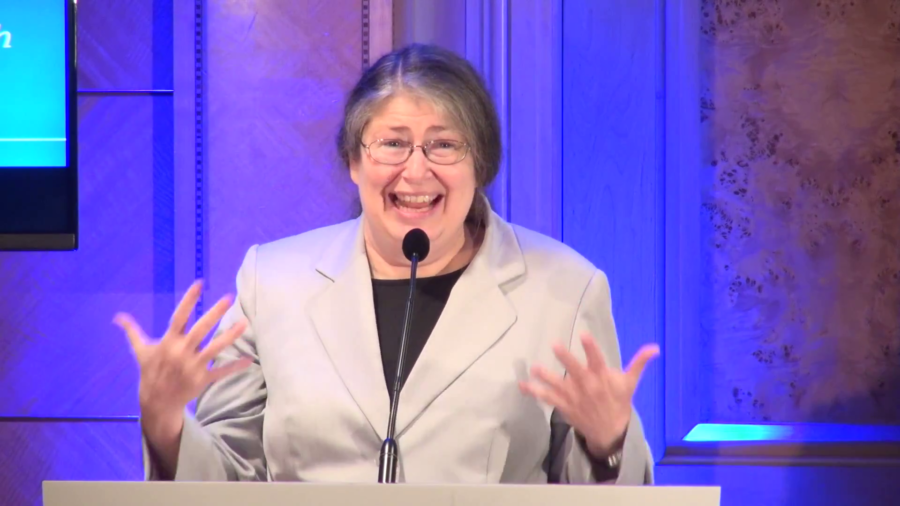Radia Perlman: Thank you very much for this honor. I would like to say that I was born knowing I was going to be designing protocols. But in fact, if I’d known more about computers when I was young, I would have said I would be happy doing pretty much anything as long as it didn’t involve computers. And I think that the fact that I really am not in love with computers means that I design things for people like myself. I want things to just work and you shouldn’t have to understand it. Too much of the time, engineers design for other engineers, and they ask you questions like, “Do you want to display both the secure and the insecure items?” Which, I happen to know what it means and it’s nonsensical. And you know, things just shouldn’t be that way.
So I very much believe that networks should be completely self-organizing. And then, I was actually pressured— You know, people told me, “Well, some of our customers really enjoy configuring things.” Well, okay fine. You want to configure things? So I put in knobs that you could play with, but you don’t have to touch the knobs. It’ll work without your touching the knobs. And if you want to play with the knobs, fine. Any setting of the knobs will still work. So I believe things should be like, incredibly easy to use because it’s actually people running it.
The other thing is that we put up with just…junk. We come to believe that it’s of course natural that your computer will freeze every few days and you have to reboot it. That might be fine for a computer. It’s not okay for the Internet. There’s no on/off switch for the Internet. So the Internet has to be absolutely robust. And so that was one of the other things that I did, before I— I mean, one of the pieces of work that I did was to make the routing of networks what’s called “self-stabilizing,” which before that it was possible that even though all of the routers were doing the right algorithm, if some history of kind of bad packets or one sick router would be emitted, the whole network would be down forever, even though the sick router that injected it would be removed. So that’s really important for it not to work that way.
And interestingly, in the paper in which I explained how the existing stuff could get into this bad state and how to design it so that it would be self-stabilizing, the last line I wrote in that paper was, “Well you know, this is how to make it work. Once you get rid of the bad guy, the network will return to normal operation.” Well, when I went back to graduate school ten years later, my manager at Digital, Tony Lauck, suggested that for my thesis I either prove my statement in this paper that you couldn’t possibly expect a network to work while the bad guy was still there, or figure out how to do it.
And so my thesis was actually even extending robustness to having a distributed algorithm, or a network, work even when some of the participants are malicious. So while they’re still connected. And the bigger the Internet is, we have to realize that there will sometimes be malicious participants. So whenever there’s information, a lot of it is going to be wrong and maliciously placed, and how can society still work? How can the network still work?
So the Internet has so many amazing challenges ahead. The basic technology of sort of getting it working is almost dwarfed by the challenges there are ahead of us. So it’s wonderful that anybody can say anything and disseminate it to the whole world. But then, how do you distinguish correct information from incorrect information? If there’s nobody sort of being able to tell you what’s true and what’s not true, it’s almost like why bother looking it up? Just make up something. The right stuff will be there, but a hundred times as much wrong stuff will be there. And so that’s a real danger.
The other thing is again, people don’t like censorship, but what about genuinely dangerous things telling you how to create horrible poisons or bombs and so forth? Do you really want there to be no censorship and to have information like that be readily available?
The other thing is that information should be free. It’s sort of so wonderful that some very poor villager somewhere can access these things, teach themselves whatever. But on the other hand, if information is free, so many newspapers and magazines are now out of business. It costs a lot of money to actually do investigative journalism. And so if we expect this stuff to be free, where will the information come from? Because somebody has to do that.
The challenge of having all of these diverse cultures cooperating together in the same Internet in terms of what should the rules be, what should be allowed to be displayed, is…you know, amazingly difficult challenges. But it is astonishing that the Internet works as well as it does today and has scaled as well as it does. But it’s certainly a fascinating time to be part of it. So thank you.
